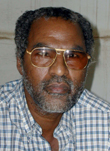Sudan’s execution this week of nine men found guilty of involvement in the 2006 assassination of editor Mohammed Taha Mohammed Ahmed, left, is seen by many there as an outrageous miscarriage of justice, spurred by a thirst on the part of President Omar al-Bashir’s regime for settling scores with the rebellious region of Darfur.
All nine men were from this oppressed and poverty-stricken region of Sudan, which al-Bashir’s power base holds responsible for the International Criminal Court‘s March indictment accusing the leader of crimes against humanity.
“This case raised from the start huge question marks and suspicions because Mohamed Taha Mohamed Ahmed had lots of problems with influential and symbolic figures of the ruling regime,” an independent Sudanese journalist told CPJ. Fearing reprisals, he spoke on condition of anonymity. “Many people doubted that those men were really responsible for his abduction and assassination. Others clearly said they were simple tools in the hands of some of al-Bashir’s top aides,” he said.
These words echoed Amnesty International‘s reaction. “The execution of the nine men is outrageous. They were arbitrarily arrested, tortured and then subjected to an unfair trial,” said the London-based international human rights group, which reported that they “had been tortured to confess to the murder and been forced to sign confessions, which were later produced in court.” The Sudanese judiciary system permits the use of torture to extract confessions from defendants.
A recent Amnesty International report on the death penalty worldwide said Sudan was among countries including Afghanistan, Iran, Iraq, Nigeria, Saudi Arabia, and Yemen that handed down death sentences after unfair trials. The report also mentioned Sudan and other countries, including Iran, Saudi Arabia, and the United States, where a “disproportionate number of death sentences were handed down to the poor, minorities and members of racial, ethnic and religious communities.”
The regime led by al-Bashir, who seized power in a military coup 20 years ago, has been fueling ethnic divisions, mainly between Muslim inhabitants of Darfur who are of African descent, and the Muslims of Arab origin who exercise power in Khartoum or live in northern Sudan.
Taha, editor of the pro-Islamist newspaper Al-Wifaq, was kidnapped from his home in Khartoum by armed men in September 2006 and found the following day decapitated in the Sudanese capital.
Ten men, including a teenager under 16 at the time of the trial, according to Amnesty International, were originally sentenced to death in November 2007 for kidnapping and killing the editor. The country’s Supreme Court upheld the death sentence for nine of the defendants in August 2008. The government initially banned reporting of the trial except by state media, CPJ research shows.
“Even members of the family of the slain editor believe that those who killed him carried out instructions from influential figures within the ruling National Congress Party and are aware that the trial and judicial procedures are far from being fair,” the Sudanese journalist said. “As the elections and referendum on the future of Sudan are drawing closer, the ruling party is waging war on political parties and reviving ethnic and tribal allegiances and mobilizing Sudanese of Arab-origin in the Northern part of the country.”
It’s in this climate that the Sudanese government has proposed a new press bill aimed, according to many Sudanese journalists and human rights lawyers, at further restricting press freedom. Journalists told CPJ that the security officers in charge of controlling the contents of Sudanese papers before going to the printer tightened their grip on independent papers since the International Criminal Court made public its warrant arrest against the Sudanese occurred. “Now the real editors are these security officers,” another independent Sudanese journalist told CPJ in March.
